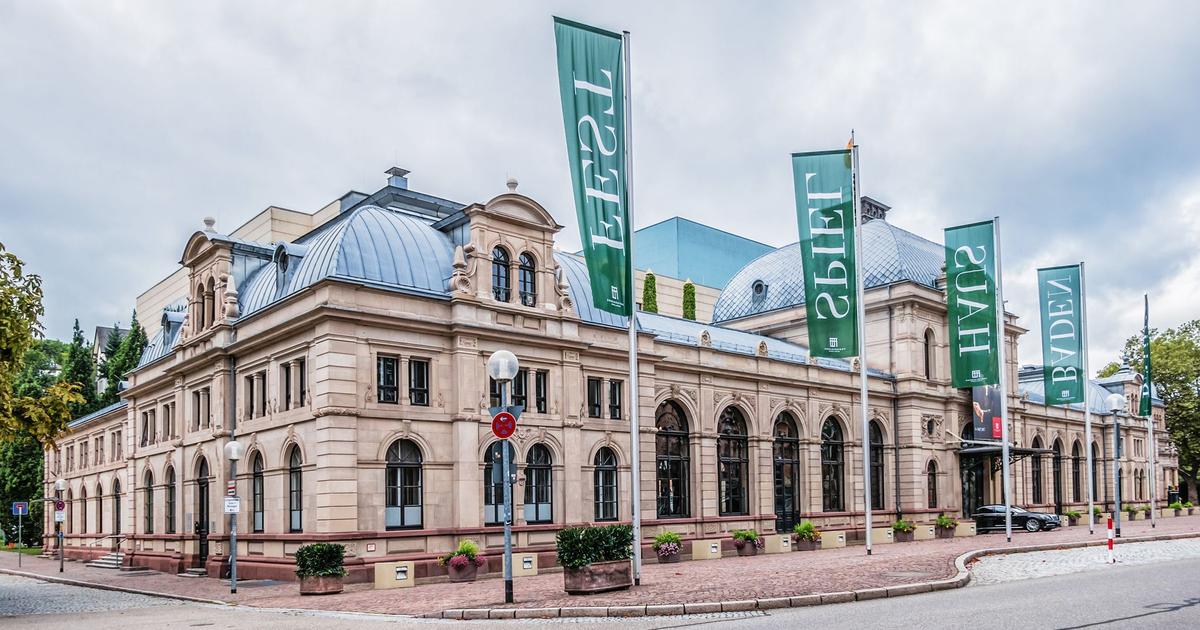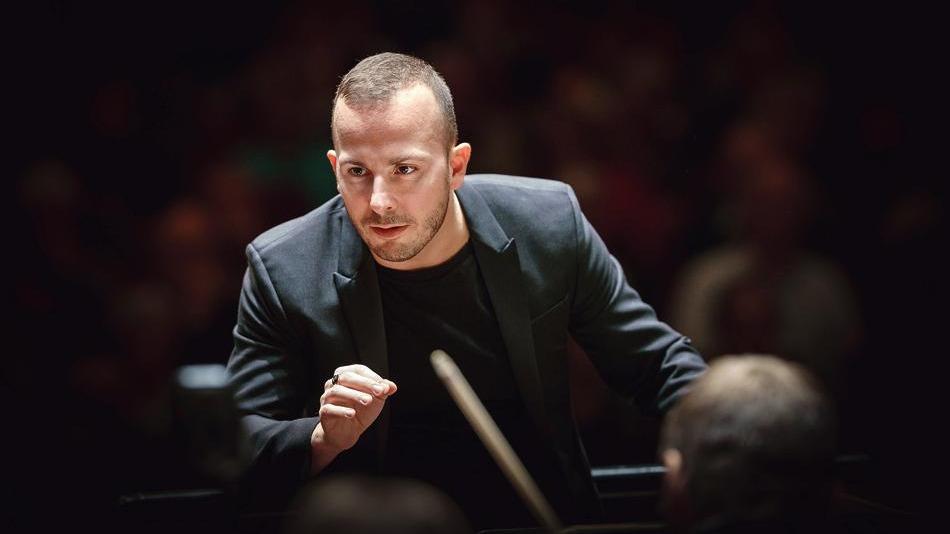When Putin invaded Ukraine, on February 24, 2022, the Evgeny Svetlanov Russian State Symphony, the main orchestra in Moscow, had just performed at the Canary Islands Music Festival under the direction of its new artistic director, Vasili Petrenko (Saint Petersburg , 46 years).
A few days later, Petrenko, who has lived in the UK since 2006 and has a solid international career, publicly condemned the invasion in a statement and decided to suspend his relations with Russia.
"All of this is very painful," he confessed to EL PAÍS with a serious face in the dressing room of the National Auditorium in Madrid.
“I have been able to make this choice, unlike the musicians in the orchestra.
Most have nowhere to go and have had no choice but to stay there.
I really don't know when I will be able to perform in Russia again, ”Petrenko assures that he visits Madrid and Alicante, on tour with Ibermúsica, leading the Royal Philharmonic Orchestra.
Three concerts, at the National Auditorium in Madrid and at the ADDA Auditorium in Alicante, from April 19 to 21, with two programs starring Prokofiev and Tchaikovsky.
More information
John Eliot Gardiner, 80 years of Bach by inhalation
Petrenko has maintained a close relationship with Spain for more than 20 years.
In 2002 she won first prize at the Cadaqués International Conducting Competition.
“That allowed me to make my debut in front of many Spanish orchestras and then I have often returned as a guest”, he explains.
He talks about the Castilla y León Symphony, but also Galicia or Tenerife, the Gran Canaria Philharmonic or the Barcelona and Catalonia National Symphony.
Last December he made his debut at Les Arts with the Orquesta de la Comunidad Valenciana.
And he remembers with admiration his recent performance with the National Orchestra of Spain, in February, which he had not conducted for 15 years.
"In the last decade, Spanish orchestras have improved a lot," he says.
And he has a theory to explain it: “It is the result of a generational change.
The excellent young batch of Spanish musicians is replacing many foreigners who nurtured the Spanish orchestras in the eighties and early nineties.
And they bring novelty, energy and freshness to them”.
He knows exactly what he is talking about, since Petrenko has been the principal conductor of the European Union Youth Orchestra (EUYO) since 2015. “Spain continues to be the country that contributes the most musicians to the EUYO, with a record of 35 string and wind members. in the meeting we had before the pandemic ”, he assures.
Vasily Petrenko.Tarlova
But the group has had to change its headquarters from London to Grafenegg (Austria), as a result of Brexit.
“I don't think European rulers understand the importance of investing in the arts on the same level as military or health spending,” he says.
He extols the figure of Winston Churchill with the famous apocryphal phrase of his during World War II: "If we don't have culture, we won't have anything to fight for."
But he highlights the difference that directing an orchestra of young students makes compared to a professional orchestra: “For most of them it is the first time they have played a composition.
It is the same difference between first love and mature love.
Petrenko was trained in Saint Petersburg, in the legendary conducting tradition of Nikolai Malko and Aleksandr Gauk, from which mythical conductors such as Yevgeny Mravinsky and, more recently, Mariss Jansons and Valeri Guerguiev emerged.
“I received a very broad education, which went beyond the musical discipline.
I was able to combine it with literature and philosophy along with various technical disciplines such as mathematics and physics.
That allows you to think beyond the notes, and not only in the stories they tell, but also in the physics of sound”, he acknowledges.
He also highlights the possibility that he had to practice many hours with a professional orchestra without the pressure of conducting concerts.
“The first time you put yourself in front of a professional orchestra is a
shock
Well, there are 50 or 60 people who look at you and judge each of your mistakes”, he explains.
For him there is a big difference in mentality between Russian and Western orchestras: “Russian orchestras require conductors with a strong hand.
They ask you to punish them if they fail to do what you want.
And they consider that without firmness and despotism they could lose discipline”.
He describes an authority that exceeds the limitations of any administration or union and that allows for sudden dismissals.
“Actually, everything began to change in Russian orchestras about 10 or 15 years ago, but despotism has grown again very quickly in the face of the current political situation,” he says.
Petrenko conducting a concert in 2013.Mark McNulty
In 2006, he moved to the UK to take up tenure with the Royal Liverpool Philharmonic Orchestra (RLPO).
“It was a radical change and I had to start a learning process, but today I am very clear that mutual respect between the orchestra and the conductor allows us to achieve better results than tyranny and fear.
Fear leads to hate, while respect makes it possible to turn the orchestra into a family, ”she recalls.
At Liverpool he also developed his love for football and has no qualms about comparing his work to that of a coach.
“There are similarities, but also two big differences: the opponent in music is the complexity of the piece you're playing and if an instrumentalist doesn't convince you, you can't replace him with another, you have to get him to play better”, he admits.
With the RLPO he has recorded for Naxos and Onyx, between 2008 and 2016, exceptional symphonic completes by Shostakovich and Tchaikovsky.
“It was unusual repertoire for an English orchestra, and when you develop a good relationship with the musicians, it is sometimes easier to deal with unknown works than well-worn and clichéd compositions,” he notes.
He maintains an excellent connection with the Liverpool Orchestra, now as a conductor laureate.
"It's like a parent-child bond and, after almost 16 years, the father must start to release the son," he says.
He can say much the same about the Oslo Philharmonic, having spent seven years there as a principal and recording several wonderful records by Scriabin and Richard Strauss.
Currently, the main orchestra for Petrenko is the Royal Philharmonic Orchestra (RPO) of London.
He took ownership in September 2021, and with it he is revitalizing the musical life of the British capital: “London does not have a large symphony hall, like Paris or Madrid.
But at least it has several useful auditoriums for different projects.
Cadogan Hall serves us for classical works up to Beethoven, we have the Royal Festival Hall for the more conventional repertoire, such as Tchaikovsky, Prokofiev and Richard Strauss, and the Royal Albert Hall for larger symphonic-choral projects such as the Second
Symphonies
,
Third
and
Eighth
, from Mahler”, he clarifies.
Being able to count on the immense headquarters of the popular Proms during the winter will allow him to develop several very interesting future projects, such as the reconstruction of the triumphant series of concerts that Wagner himself conducted there, in May 1877, and the recovery of the double program created by Tchaikovsky, in 1892, with the ballet
The Nutcracker
and the opera
Iolanta
.
The conductor and orchestra after a concert.MARK MCNULTY
In Madrid he will appear, this Wednesday and Thursday, April 19 and 20, for the first time as head of the RPO.
The British orchestra made its debut in Spain, with Ibermúsica, in 1974, and has played almost a hundred concerts in our country with conductors as diverse as Erich Leinsdorf, Jesús López Cobos and Yuri Temirkanov.
The first program will focus on the combination of the two suites from the ballet
Romeo and Juliet
, by Prokofiev, together with
Finlandia
, by Sibelius, and the
Violin Concerto no.
1
, by Bruch, with Esther Yoo as soloist.
“Our recording of this concerto with her has just been released, on DG, but the idea of the program is three works from pretty much the same period and related in some way to Britain: Sibelius has always been a favorite with English audiences, on Bruch you can detect that combination between the Jewish and the British northern nature, and the connection with Prokofiev is clearly Shakespearean, ”he reports.
For the second program, on Thursday the 20th, they will play the
Manfredo Symphony
, by Tchaikovsky.
But they will open it with Dvorak's
Cello Concerto
, which will feature the young Armenian cellist Narek Hakhnazaryan, replacing the Norwegian Truls Mørk.
“They are two compositions that mean coming back home, but assuming an influence from German orchestration.
I must confess that after recording the
Manfredo Symphony
more than a decade ago, in Liverpool, the work lost its freshness in my mind.
And now I'm redirecting it with new ideas."
We end by commenting on his relationship with the other great Petrenko of classical music: Kirill, the chief conductor of the Berlin Philharmonic, who will visit Spain with his orchestra the first week of May.
“We don't have any family ties, but we have a lot of fun when we get confused.
In 2016, we coincided rehearsing at the Bavarian State Opera.
I was conducting
Boris Godunov
and he was
conducting The Nuremberg Mastersingers
, and we baffled the orchestra by exchanging rehearsals.
We had a really good time, ”she recalls.
Precisely, in July, Vasili will return to Munich to direct a new revival of that production of Mussorgsky's opera by Calixto Bieito.
“I have more plans to direct operas in Munich, Amsterdam, Zurich and New York, and I have even had some proposals from the Teatro Real in Madrid.
But the problem is that an opera implies two months of total dedication”, he clarifies.
Subscribe to continue reading
Read without limits
Keep reading
I'm already a subscriber

/cloudfront-eu-central-1.images.arcpublishing.com/prisa/DEA63T6EFNEI3AN6SIIYXCQQSI.jpg)

/cloudfront-eu-central-1.images.arcpublishing.com/prisa/XWGQ7OKMRBDIZHWIQPOHFW54FM.jpg)





/cloudfront-eu-central-1.images.arcpublishing.com/prisa/YFM5JDTCWJBMHCBXYX3RRJU7WU)